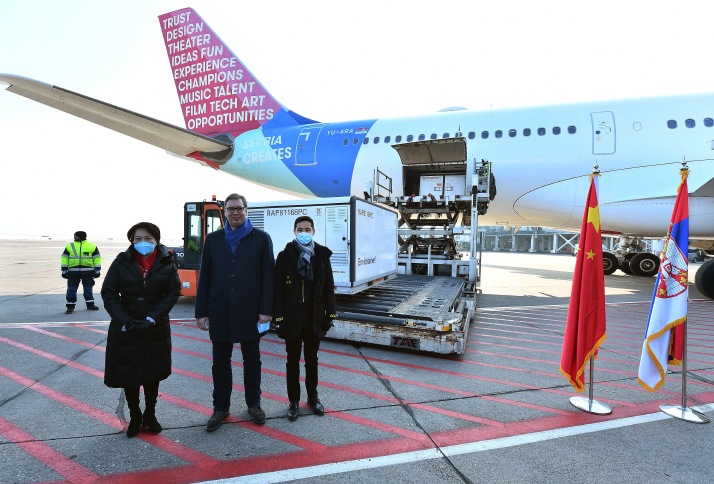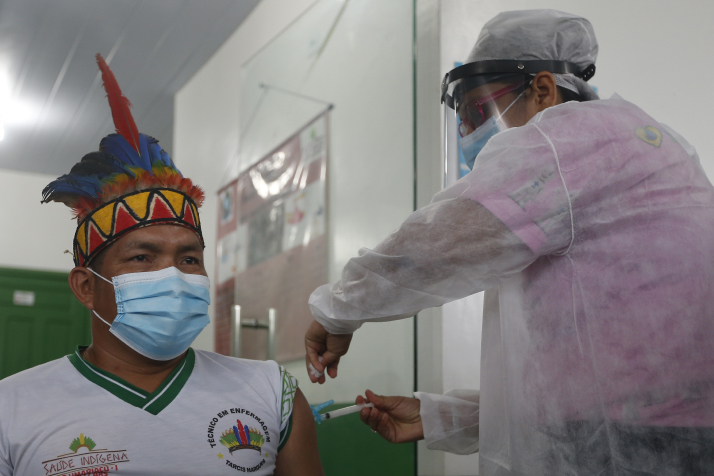| World |
| Concrete steps are underway to make Chinese vaccines global public goods | |
|
|
 Serbian President Aleksandar Vucic (center) and Chinese Ambassador to Serbia Chen Bo (left) receive the shipment of China-made coronavirus vaccines at the Belgrade Airport, Serbia, on January 16 (XINHUA)
On January 27, in a live broadcast to the whole nation, Indonesian President Joko Widodo received his second dose of the novel coronavirus disease (COVID-19) vaccine developed by China's biopharmaceutical company Sinovac Biotech. Recently, Turkish President Recep Tayyip Erdogan, Seychelles President Wavel Ramkalawan and many other state leaders have also publicly received vaccines developed by Chinese companies, showing their confidence in the safety and efficacy of the Chinese products. As COVID-19 continues to spread, people place high hopes on vaccines to rein in the pandemic. As of February 2, 13 countries have approved emergency use of Chinese vaccines, one developed by Sinovac Biotech and the other by Sinopharm's bioscience subsidiary China National Biotec Group, and over 50 countries have asked to import from China. Some countries have already received vaccines produced by Chinese companies. In Serbia, 1 million doses of Sinopharm's product arrived at Belgrade and were welcomed by President Aleksandar Vucic at the airport on January 16. With the Sinovac vaccine CoronaVac, Brazil launched an inoculation program in about 6,000 villages, covering more than 400,000 residents. Turkey also started a mass vaccination program with CoronaVac. Safety and efficacy Compared to other vaccines, the research and development of COVID-19 vaccines has been rapid. On April 12, 2020, vaccines developed by the Wuhan Institute of Biological Products under Sinopharm obtained the world's first clinical trial approval and Phase I/II clinical trials were launched in Wuzhi County, Henan Province in central China. On June 23, Sinopharm launched the world's first Phase III clinical trial of the COVID-19 inactivated vaccine in the United Arab Emirates (UAE). The UAE also became the first country to approve emergency use of Chinese vaccines on September 14 of last year. "Sinopharm started voluntary vaccinations among researchers at the end of March 2020. I was administered the first dose on March 23," Yang Xiaoming, Chairman of Sinopharm's China National Biotech Group, said. "Antibodies were detected in my blood in the second week following the injection, and high antibody levels were detected about two weeks after the second inoculation." Chinese vaccines can be kept at temperatures between 2 and 8 degrees Celsius, which makes them easier to store and transport, while vaccines made by Pfizer have to be stored and shipped at minus 70 degrees Celsius, which requires costly cold chain delivery facilities. The efficacy of Chinese vaccines is also encouraging. Beijing has approved their emergency use for high-risk groups since last July. Among those who were vaccinated, more than 60,000 had traveled abroad to areas with severe epidemic situation, and no serious infections had been reported, Zheng Zhongwei, an official with the National Health Commission heading China's COVID-19 vaccine development team, said at a press conference on December 19, 2020. CoronaVac has an efficacy rate of 91.25 percent in clinical trials in Turkey and 65.3 percent in Indonesia. The efficacy rate in Brazil varies according to different standards. According to reports, infected cases in Brazil are divided into six categories: asymptomatic, very mild symptoms, mild symptoms, level 1 moderate symptoms, level 2 moderate symptoms, and severe symptoms. Clinical studies in the country suggested the vaccine had a general efficacy rate of 50.38 percent if the last five kinds of cases were included, but it reached 78 percent effective if the "very mild cases" are ignored, and 100 percent effective in preventing severe cases. "It's normal to get varying results in different countries, and the clinical trials are influenced by multiple factors," Yin Weidong, Chairman and CEO of Sinovac Biotech, told Xinhua News Agency, adding that all the participants in the Phase III clinical trials in Brazil are medical workers in high-risk environments who might be exposed to the virus many times. Serbia's feedback to Sinopharm's vaccine is positive. The Agency for Medicines and Medical Devices of Serbia and its employees "assessed the necessary documentation and scientific evidence in a highly professional and thorough manner according to all EU and World Health Organization (WHO) standards, which confirmed the quality, efficacy, and above all the safety of the Chinese vaccine," Pavle Zelic, an official with the agency, told local media. "As an ordinary person and the president of Serbia, I am convinced of the quality of the Chinese vaccine, which will be decided by our competent agency," Vucic said.  A man is administered a China-made coronavirus vaccine in Tabatinga, Brazil, on January 19 (XINHUA)
A ray of hope "The world is on the brink of a catastrophic moral failure—and the price of this failure will be paid with lives and livelihoods in the world's poorest countries," Tedros Adhanom Ghebreyesus, WHO Director General, said on January 18, criticizing the unequal distribution of COVID-19 vaccines. Vaccines bring people hope of returning to normal life. However, unequal distribution of vaccines puts the lives and health of people in poorer countries at risk, further highlighting the gap between the haves and have-nots. While wealthy countries such as Canada and the U.S. have purchased enough vaccine doses to immunize their entire populations multiple times over, less wealthy countries are left far behind. One poor country received a mere 25 doses while over 39 million doses have been administered in nearly 50 richer nations, Tedros said. China has joined the WHO-led COVAX initiative to promote international cooperation on vaccines and their equitable global distribution. On February 3, China announced that at the request of WHO, it has decided to provide 10 million doses of vaccines to COVAX to meet the urgent needs of other developing countries. "This is another important measure taken by China to promote the equitable distribution of vaccines, advance international cooperation in fighting the pandemic, and uphold the concept of a global community of health for all," Foreign Ministry spokesperson Wang Wenbin said at a daily press briefing. As WHO has begun to review the emergency use authorization of China's vaccines, Wang pledged continued cooperation of Chinese enterprises and expressed hope that WHO would complete this work as soon as possible. In addition, China is assisting 14 developing countries such as Pakistan, Brunei and Nepal. Going forward, it will also assist another 38 developing countries with vaccines, Wang said on February 1. According to Yin at Sinovac, his company has launched a second production line, increasing its annual production capacity to 1 billion doses. The company will also export semi-finished jabs to some countries, and help build local filling and packaging lines in recipient countries to improve production capacity and efficiency. "We will continue to expand production capacity," Yin said. "We are facing uncertainties related to the pandemic and demand for vaccines, which shall not be responded to with the usual demand-supply business model alone. Vaccines are public goods and we should shoulder corporate responsibilities." "We hope the international community will work together to promote the equitable allocation and use of vaccines globally to make sure developing countries have access to and can afford them," Wang said. (Print Edition Title: Carriers of Hope) Copyedited by Sean Connolly Comments to wenqing@bjreview.com |
|
||||||||||||||||||||||||||||||
|